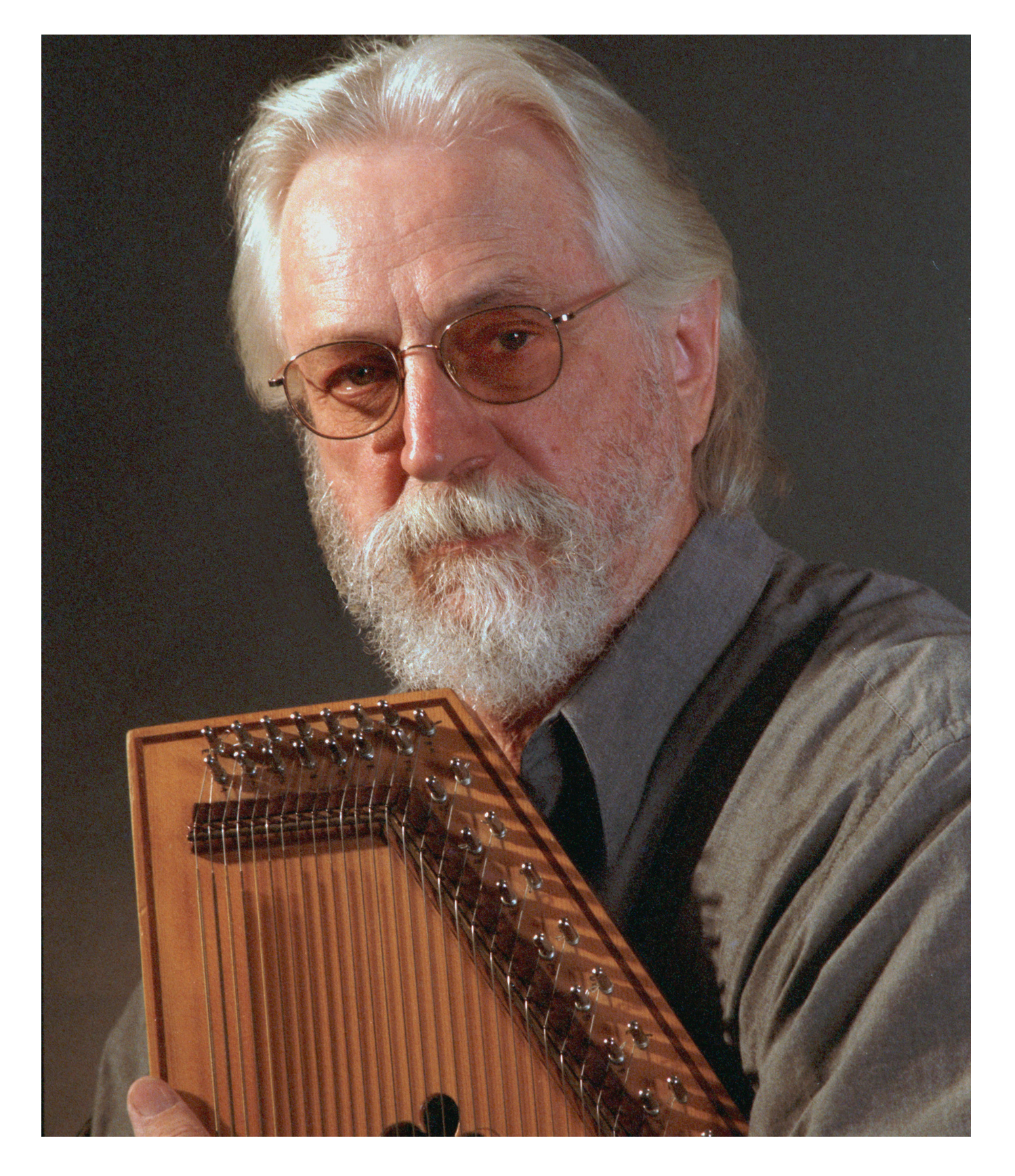
Born in Yorktown, Virginia, Bryan Bowers was raised in New Bohemia near Petersburg of the Civil War's Battle of the Crater fame. As a child, Bowers would tag along with the field workers and gandy dancers and learned to sing old call-and-answer songs. Bowers recalls, "The music I heard while working in the fields was mesmerizing. And, I'd see the gandy dancers coming down the tracks, setting the rails and getting their ties straight. You've heard that song:
`Whup Boys, Can't you line 'em?, Chack-a- lack.'Whup Boys, can't you line 'em? was the call theleader would sing. Chack-a-lack was thebounceback of the hammer after falling on thepin. I just thought that music was something thateveryone did. It was years later that I realizedwhat I'd been raised around."
Bowers enrolled at Randolph Macon College in Ashland, Virginia, but found that college was not satisfying an emptiness he felt. Three hours short of earning a degree in Spanish, Bowers dropped out. About the same time (the late '60s), Bowers discovered music when he took up the guitar. "The roots of the music had gone real deep in me. Music was real fulfilling, unlike anything I had ever done before."
It wasn't long before Bowers encountered the autoharp. "I ran into a guy that played several instruments and could get the harp in good tune. He played without any fingerpicks, just with his fingernails. He had a real sprightly style on it. It was the first time I'd heard someone play it in good tune and play it well. It opened my eyes and my ears. I went out and got one the next day."
Bryan relocated to Seattle in 1971 and played for coins as a street singer and in bars for the right to pass the hat. Once he had polished his technique, he headed east in a 1966 Chevy panel truck he affectionately called "Old Yeller." "The Dillards heard me in DC when I went to the Cellar Door," recalls Bowers. "I introduced myself and played the `Battle Hymn of the Republic' to how them how the harp worked. Sam Bush, Curtis Burch and Courtney Johnson of the New Grass Revival were there. I didn't realize how presumptuous I was being. The Dillards took me to a bluegrass festival at Berryville, Virginia and when they got an encore, they put me out there for their second encore, saying `Here's a guy you ought to hear.' The bluegrass community has been real supportive."
Bower's creativity and talent have won him induction into Frets Magazine's First Gallery of the Greats, after five years of winning the stringed instrument open category of the magazine’s readers' poll. This distinction put Bowers alongside other luminaries, such as Chet Atkins, David Grisman, Stephan Grappelli, Itzhak Perlman, Tony Rice, Rob Wasserman and Mark O'Connor, recognized for their personal accomplishments. In 1993, Bryan was the first living member inducted into the Autoharp Hall of Fame to stand only with Maybelle Carter, Kilby Snow, and Sara Carter. In 2003, Bryan organized and co-produced Autoharp Legacy. He brought together 55 autoharp players and created the definitive three-CD set on autoharp music. In addition, Bryan Bowers’ critically acclaimed recordings on Flying Fish/Rounder Records are: The View From Home, Home, Home On the Road, By Heart, Friend For Life and For You.
From his rather unglamorous beginning as a street singer, Bryan Bowers has become a major artist on the traditional music circuit. He has redefined the autoharp and is also well known as a singer-songwriter. Bryan has a dynamic outgoing personality and an uncanny ability to enchant a crowd in practically any situation. His towering six foot four inch frame can be wild and zany on stage while playing a song like `Dixie' and five minutes later he can have the same audience singing `Will The Circle Be Unbroken' in quite reverence and delight.
In 2006 Bryan’s landmark recording, Bristlecone Pine, was released on Seattle Sounds with distribution assistance by Plectrafone Records. Autoharp partner and close friend, Ron Wall, directed and created the recording. Several of Bryan’s friends from through-out the years offered musical assistance, including: Tim O’Brien, Sam Bush, Mark Howard, Alan O’Bryant, Pat Enright, Dennis Crouch, Stuart Duncan and Ron Wall. A feature story on Bryan in the Feb/March 2007 issue of Dirty Linen stated, “Like the venerable pine of the title track, autoharp virtuoso Bryan Bowers’ vocal style and instrumental prowess have grown in depth and genius over the decades...to listen to this recording is to experience all the colors and emotions of a lifetime. Truly Bowers’ finest work to date…”
Crabby Old Man was released in 2011. This anti-produced and unvarnished recording offers 12 charming selections from Bryan’s vast repertoire. This CD sans editing, overdubs or compression sounds as if Bryan is playing in your living room for just you and your friends. Bryan Bowers’ Live at Winterfolk 2015 is Bryan’s first live album and features 12 selections that he loves. This CD was recorded at Portland’s premier folk event and 28th annual fundraiser for Sisters of the Road. These recordings give the listener a wonderful musical experience fromthe man who re-defined the autoharp.
Woodland Dream was released in 2019 and features the Bryan Bowers Band, consisting of Bryan Bowers and two multi-talented musicians, Danny Knicely (world class Virginian mandolinist, guitarist, and mandocellist) and Geoff Goodhue (New England-based singer and multi-instrumentalist), creating American folk and mountain music at its finest. Sunset Scribblins, Bryan’s newest CD from 2020 contains 24 of Bryan’s poems, read by the master writer himself.
For over six decades, Bryan Bowers has been to the autoharp what Earl Scruggs was to the five- string banjo. He presents instrumental virtuosity combined with warmth, eloquence, expression and professionalism.